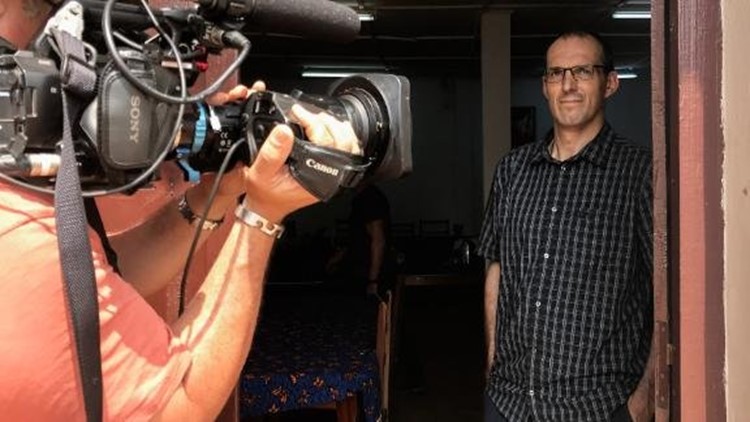German Catholics are meeting to debate what remain taboo subjects for many in the church — lifting celibacy policies and whether to allow women to play bigger roles in ecclesiastical life.
The German Bishops Conference and the Central Committee of German Catholics will start a two-year process of reckoning and reform on Sunday, the first day of Advent. The meeting comes in response to damning revelations of sexual abuse in the church.
They will discuss issues that experts have identified as having contributed to the scandal: “priestly life,” including celibacy; the position of women within the church; sexuality and sexual morale of the Catholic church; and the power and the control of the power within the church.
The outcome of the debate will not change Catholic doctrine. However, the plan to modernize the church in Germany has attracted criticism from the Vatican: some of the most senior officials, including Pope Francis, have expressed concerns that the conference could ultimately lead to the fragmentation of the church.
The push to launch reforms was sparked by a shocking report into sexual abuse published last year. The Catholic Church in Germany admitted to total of 3,677 cases of child sex abuse by the clergy between 1946 and 2014 in the report commissioned by the Bishops’ Conference.
More than half of the victims were 13 years old or younger. The majority were boys and in most cases, the abuse took place over lengthy periods of time. Every sixth case involved a rape and at least 1,670 clergy were involved.
The report shook the church in Germany to its core and prompted calls for action. At a meeting in the spring, a majority of German bishops voted to start a reform process to ensure nothing like this happens again.
Christian Bauer, a theology professor at the Innsbruck University, said the issues the conference will discuss are not new.
“How is power checked and balanced in the church, how can we go beyond the homophobic and misogynist church… all these are old issues, but they became urgent in a new way since the abuse crisis have started,” he told CNN.
But the prospect of reopening issues that have been settled for centuries is a scary thought for the Vatican. The situation escalated so much that Pope Francis employed one of the most powerful — and rarely used — pontiff’s tools and wrote an open letter to the German people, urging them to preserve the unity of the church.
Archbishop Nikola Eterović, the Vatican’s Apostolic Nuncio to Germany, said this was the first time a pope has written specifically to the German people since the encyclical of Pius XI in 1937. That famous document denounced the Nazi regime.
But the German Catholics are pressing ahead, insisting that any decision taken during the Synodal Assembly will be binding.
“The idea is that this is not just another forum where everyone just talks and no decisions are taken. At the end there will be a vote and the (result of the) vote will be given to the Holy See, to Pope Francis, to take further action,” said Ulrich Lehner, a theology professor at the University of Notre Dame.
Matthias Kopp, the spokesperson for the German Bishops’ Conference, told CNN the clash with the Vatican was mostly down to a misunderstanding.
“There will not be a revolution coming from Germany to Rome,” he said. Asked what would happen if the Vatican refused to act on the recommendations that come from Germany, Kopp said more discussions would follow.
However, he admitted that some of the issues that will be discussed are controversial and that many cannot be decided on the national level.
“That is a problem of the process,” Kopp said. “But, you know, if we stay here in our offices and we are doing nothing, I think that would be ridiculous… and there was, of course, a very hard discussion and of course, we are informing Rome, but we need this open space [for] discussions in Germany.”
The Bishops’ Conference is hoping to find allies in its quest. It has invited representatives of the church from neighboring countries. And, while shrinking, the German church is still seen as powerful — and rich.
“Numbers wise, the German church is no longer very important as a global player in Catholicism, it is also no longer that important as a theological powerhouse, where they are important, mostly, is in financial power,” said Lehner.
“If you consider the Holy See being in quite a bit of financial disarray, you can easily see how this increases the German influence to an unhealthy degree,” he added.
It’s not just the sexual abuse scandal that the church in Germany needs to address. The number of German believers has been plunging in recent years. Older parishioners are dying out, but on top of that, tens of thousands of others are actively leaving the church each year. The number of young people choosing to get confirmed is dropping.
“We have to do something … many people are leaving the church because there is no trust in the church, we have to give answers,” Kopp said, adding that in the “early 21st century, we cannot work in the same way we worked maybe 30 years ago.
Lehner is skeptical the conference will help reverse the trend. “The church in Germany is in such a rapid decline that the Bishops really are like headless chicken, I’m sorry to use that image, but I think it’s true … they’re realizing that their entire system is collapsing, and they really don’t know how to address it.”



